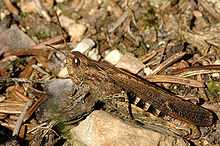Chorthippus biguttulus
| Chorthippus biguttulus | |
|---|---|
 | |
| Chorthippus biguttulus female | |
| Scientific classification | |
| Kingdom: | Animalia |
| Phylum: | Arthropoda |
| Class: | Insecta |
| Order: | Orthoptera |
| Family: | Acrididae |
| Subfamily: | Gomphocerinae |
| Genus: | Chorthippus |
| Species: | C. biguttulus |
| Binomial name | |
| Chorthippus biguttulus | |
Chorthippus biguttulus, the Bow-winged grasshopper, is one of the most common species of grasshopper found in the dry grassland of northern and central Europe.[1] It is part of a group of species (biguttulus-group) that are very difficult to identify morphologically. Chorthippus biguttulus was previously classified (with C. brunneus and C. mollis) as a single species Stauroderus variabilis. The three species were distinguished using song characteristics. [2]
Distribution
The range of the Bow-winged grasshopper extends from the Finland and Scandinavia in the north to the Alps and Pyrenees in the south.
Physical appearance


Females grow to approximately 2cm and are larger than males that grow to approximately 1.5cm. Males often have a red tip to the abdomen while females do not. They can be extremely variable in colour from green to black-brown to rose.
According to "The Ancestors Tale" by Richard Dawkins; these two grasshoppers (C. brunneus & C. bigguttulus) are morphologically indistinguishable but will not mate due to difference in their calls. If a proper call is produced while the two species are placed in proximity; mating will occur with fertile offspring resulting. This is thought to be the early stages of species divergence in progress.
 |
Chorthippus biguttulus stridulation
Song of Chorthippus biguttulus
|
| Problems playing this file? See media help. | |
References
- ↑ Bellmann, Heiko (1988-05-05). Field Guide to the Grasshoppers and Crickets of Britain and Northern Europe. Collins. ISBN 0-00-219852-5.
- ↑ Ramme, W (1921). "Orthopterologische Beitrage". Arch. Naturgesch. 86: 81–166.